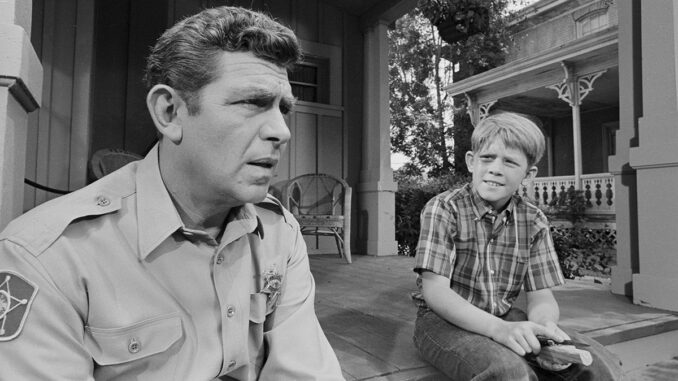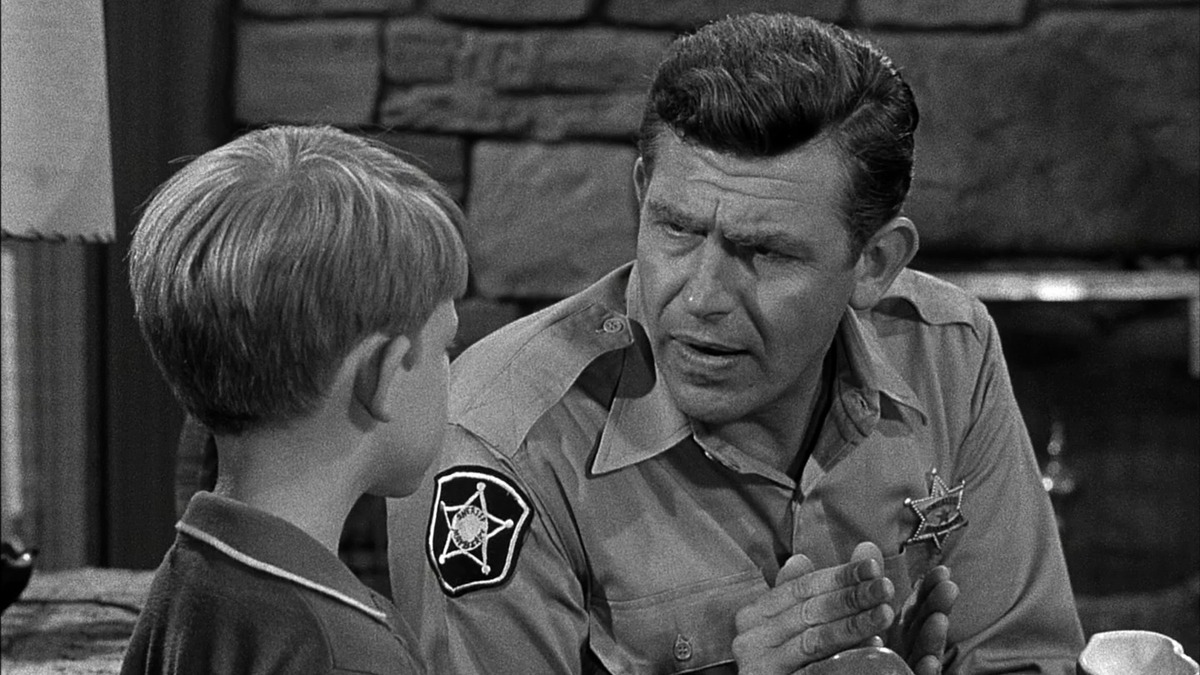
Introduction: A Small-Town Father, a Big-Time Debate
For a show known for its calm, homespun wisdom, The Andy Griffith Show stirred up one surprising behind-the-scenes debate: How should Andy discipline his son, Opie? What might seem like a minor creative decision actually sparked deep conversations among the show’s creators. Should Andy spank his son on screen? Or was there a better way?
The answer shaped the heart of the series—and helped define the show’s lasting legacy.
The Show’s Warm Legacy of Fatherhood
A Different Kind of TV Dad
Andy Taylor wasn’t your typical 1960s television father. While other sitcoms showed dads who were either too perfect or too distant, Andy was warm, human, and relatable. He raised Opie as a single father, balancing discipline with empathy.
Why Andy and Opie’s Relationship Mattered
The father-son bond between Andy and Opie (played by Ron Howard) became the emotional core of the series. Fans didn’t just tune in for Mayberry’s charm—they came back for the life lessons and genuine love between Andy and his boy.
The Moment That Sparked the Disciplinary Debate
The Episode: “Opie the Birdman”
In Season 4, Opie accidentally kills a mother bird with his slingshot. The boy is wracked with guilt. It was a turning point—and the perfect moment to show how Andy would respond as a father.
But here’s the twist: The creative team couldn’t agree on how Andy should handle it.
The Big Question: Should Andy Spank Opie?
Some of the show’s writers and producers believed that Andy should spank Opie to teach him a clear lesson. It was the cultural norm at the time, and many believed it would reflect real parenting.
Others strongly disagreed, feeling a spanking would break the trust viewers had in Andy as a compassionate father.
Andy Griffith Took a Stand
Griffith’s Belief in Calm Parenting
Andy Griffith himself leaned away from harsh discipline. He believed in using understanding and empathy to reach Opie. Griffith felt the audience didn’t need to see punishment—they needed to see growth.
Ron Howard’s Take on It All
Ron Howard, even as a child, sensed the importance of these scenes. In later interviews, he praised the show’s “emotional honesty,” noting that kids watching the show felt seen—not scolded.

The Writers’ Room Tension: A Battle of Perspectives
Old-School vs. New-School Parenting
Some writers on the show were older, bringing with them a belief in traditional discipline—that a spanking was a symbol of authority and proper parenting.
Others pushed back, arguing that The Andy Griffith Show should model a more thoughtful, modern approach.
Why the Debate Was Bigger Than TV
This wasn’t just about a scene. It was a reflection of a larger cultural shift happening in the 1960s. American families were rethinking how they raised their children, and the show was right in the middle of it.
The Final Decision: No Spanking, Just Accountability
Letting Opie Feel the Consequences
Instead of punishing Opie physically, Andy chose a gentler path. He made Opie listen to the orphaned baby birds chirping in the nest. It was a quiet moment—but more powerful than any scolding could’ve been.
A Scene That Still Moves Viewers
That decision gave us one of the most beloved and memorable episodes of the entire series. Fans remember it not because Andy yelled, but because he didn’t.
Why This Creative Choice Still Matters
Television That Taught Without Preaching
By refusing to show physical punishment, the creators set a new tone. They offered a model of parenting that was firm but loving, gentle but effective.
A Legacy That Influenced Generations
That episode (and others like it) influenced how future TV dads were written—from Danny Tanner in Full House to Coach Taylor in Friday Night Lights.
The Power of Quiet Lessons
Silence Over Shouting
Sometimes, the strongest parenting tool is letting children sit with their own feelings. Andy’s silence, his calm presence, and his wise choices became more impactful than any spanking would have been.
Actions Over Anger
Andy didn’t raise his voice. He raised his standards. That subtle difference made The Andy Griffith Show feel ahead of its time.
The Shift in Television’s Moral Compass
From Sitcoms to Substance
Plenty of shows before The Andy Griffith Show used slapstick or stern dads to drive home their messages. But Mayberry took a different route—it trusted viewers to understand emotion and consequence without a laugh track.
Mayberry’s Moral Code
The show gave us a blueprint: community, kindness, and parenting from the heart.
Andy’s Parenting in Other Episodes
Consistency Was Key
In multiple episodes, Andy modeled this same calm authority. He didn’t waver. Whether Opie lied, got in trouble at school, or disobeyed, Andy guided him without anger.
Lessons Wrapped in Love
Every episode delivered a lesson—but it always came wrapped in love, never punishment. That’s what kept viewers coming back.
The Fan Response: America Approved
Audiences Embraced the Choice
Fans loved Andy’s parenting style. Letters poured in. Viewers felt connected because the show didn’t talk down to them—it talked with them.
The Ratings Proved It Worked
The Andy Griffith Show consistently ranked in the top 10 throughout its run. Clearly, Andy’s style hit the right note.
Modern-Day Parenting Looks Back at Mayberry
Why Andy’s Style Still Feels Fresh
Today’s parents face different challenges—but Andy Taylor’s approach still resonates. Calm, communication, and compassion never go out of style.
What We Can Still Learn
Whether you’re raising a child or leading a team at work, the idea is the same: guide, don’t guilt. Lead, don’t lecture.
The Takeaway: Why This Debate Changed TV History
What started as a simple behind-the-scenes disagreement became a moment that helped redefine the role of fathers on television. Andy Taylor showed us that parenting, at its best, isn’t about power—it’s about presence.
Conclusion: A Quiet Revolution in Mayberry
Andy Griffith and his team made a bold choice when they refused to use punishment as a shortcut for parenting. By doing so, they shaped the heart of The Andy Griffith Show and helped set a new standard for how fathers could be portrayed on screen.
In a world that too often reaches for the loudest solution, Andy Taylor chose the quietest—and it echoed the loudest.
FAQs
1. Did Andy ever spank Opie in The Andy Griffith Show?
No, Andy Taylor never spanked Opie on-screen. The show emphasized calm and reflective parenting instead of physical punishment.
2. What episode sparked the debate over Opie’s punishment?
The Season 4 episode titled “Opie the Birdman” was the pivotal point where creators discussed how Andy should handle a moral lesson.
3. Why was the choice to avoid spanking so impactful?
It showed a new, thoughtful way of disciplining children on TV, offering an alternative to harsh or physical punishments common in media at the time.
4. What did Ron Howard think about these parenting scenes?
Ron Howard has spoken fondly of the show’s emotional depth and praised the authentic father-son moments that helped shape his own values.
5. Did the audience react positively to Andy’s parenting style?
Absolutely. Viewers praised Andy’s calm, wise approach, which helped make the show one of the most beloved sitcoms in American television history.